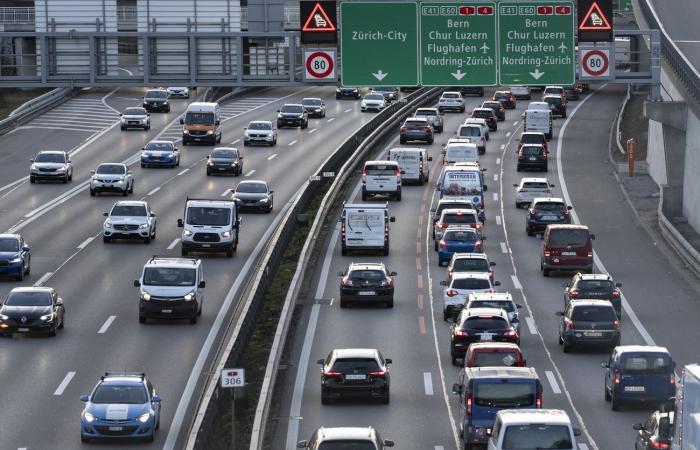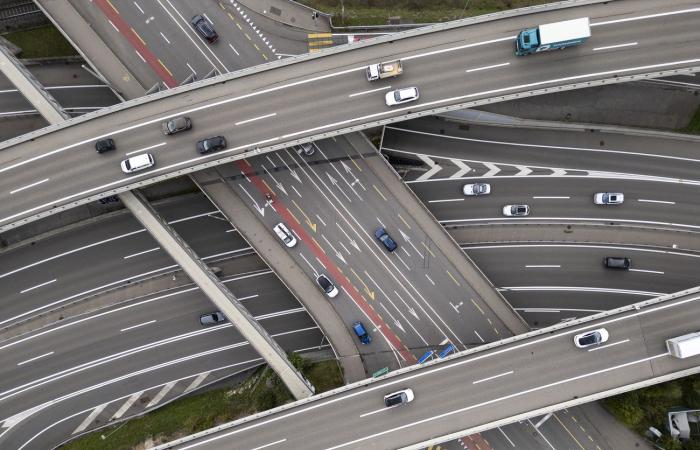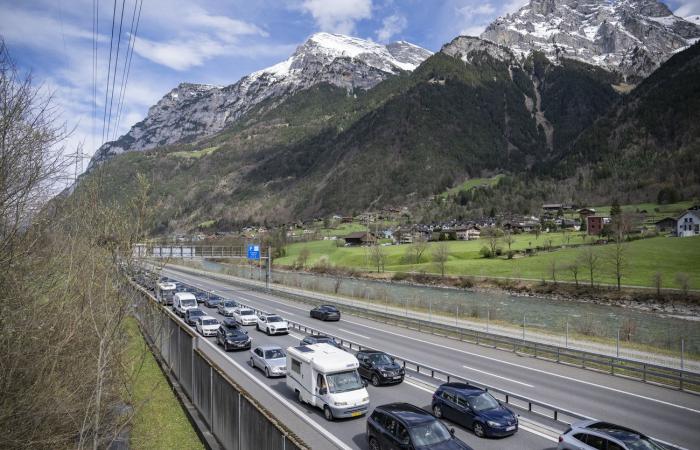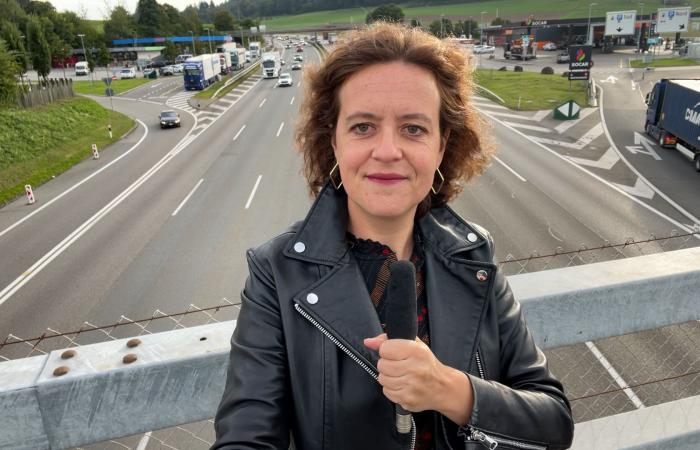The Federal Council and Parliament planned to widen six existing sections at strategic locations, mainly on the A1.
Keystone / Leandre Duggan
On this Sunday of federal votes, the latest projections from the gfs.bern institute give the majority no to motorway widenings at 52%, with a margin of error of +/- 2%. Although polls predicted a close result, this outcome surprised both camps.
This content was published on
November 24, 2024 – 2.49pm
52% of the Swiss would refuse the authorities’ project aimed at relieving congestion on the road network, according to refined projections released early Sunday afternoon by the gfs.bern institute. The result could, however, be decided in a pinch, the margin of error being +/- 2%.
Among the final results already in French-speaking Switzerland, the rejection is clear: Jura says no at 62.6%, Neuchâtel at 62.5%, Vaud at 58.6%, Friborg at 56.3% and Valais at 54 .2%. The still partial results from Geneva point in the same direction. Among the other final results, St. Gallen, Zug, Schwyz, Aargau, Nidwalden, Basel-Landschaft and Solothurn approve the road widenings, while Graubünden, Ticino, Lucerne, Glarus and Uri refuse them.
The Swiss electorate was called upon to vote on the largest motorway project in recent decades: the Federal Council and Parliament want to widen six existing sections in strategic locations, mainly on the A1, the longest motorway in the country, in order to curb traffic jams which have reached records around major cities in recent years.
Plus
Plus
Should the Swiss motorway network be expanded? The population will decide
This content was published on
25 sept. 2024
A referendum has been launched against the six-vote extension of the A1 motorway. The people will vote on November 24.
read more Should the Swiss motorway network be expanded? The population will decide
Business circles, organizations representing automotive interests and right-wing parties – UDC and PLR – led the campaign in favor of the project, arguing the need to reduce bottlenecks and the strategic importance for Switzerland of having functional and reliable road infrastructure, in order to meet growing mobility needs.
According to surveys conducted by the gfs.bern institute before the vote, these arguments resonated most strongly with the male population, right-wing sympathizers, residing in small towns and with high incomes.
A surprise for both camps
On Sunday afternoon, Ticino Center senator Fabio Regazzi, co-chair of the committee in favor of motorway extensions, said he was surprised by the rejection of the projects. Traffic jams are a problem for the economy, he told German-speaking radio SRF, “I find it difficult to understand why this has not been understood.” Believing that such a vote would have been easily won a few years ago, he spoke of a “certain change” in society and a problem of mobilization: “We had difficulty,” he told German-speaking radio SRF. Only a few cantons were concerned. In the other cantons, it was not as easy to convince people.”
The referendum opposing the widening projects, entitled “Stop the motorway madness”, was carried by a broad alliance led by the Transport and Environment Association (ATE) and the environmental organization active-trafiC, in the name of environmental protection. Opponents of enlargement also insisted on the “exorbitant” cost of the project, estimated at some 5 billion francs, and the risk that increased motorway capacity would have a counterproductive effect in the long term, by contributing to further increase the traffic.
Arguments to which women, younger people, people affiliated with left-wing and environmentalist parties, as well as those with higher levels of education were more sensitive.
At the end of the vote on Sunday, the Vaudois Green MP David Raedler, representative of the referendum committee, said he was “positively surprised”, specifying that he saw in the looming no a “mature choice” of the population, to which “we cannot promise anything.
Strong polarization
Support for highway widening eroded as the campaign wore on. During the first poll carried out by gfs.bern for the SSR in mid-October, a small majority planned to vote yes to the project, but the situation reversed in the following weeks. The second poll, published on November 13, gave a narrow lead to the no side (51%). Two percent of those surveyed said they were undecided, leaving the outcome of the vote open.
Proof of the strong polarization of the population and the degree of uncertainty around this object, another poll published the same day gave the yes lead by a small percentage point, while also highlighting the clear trend of progression no.
>> Read our decryption of the second SSR survey:
Plus
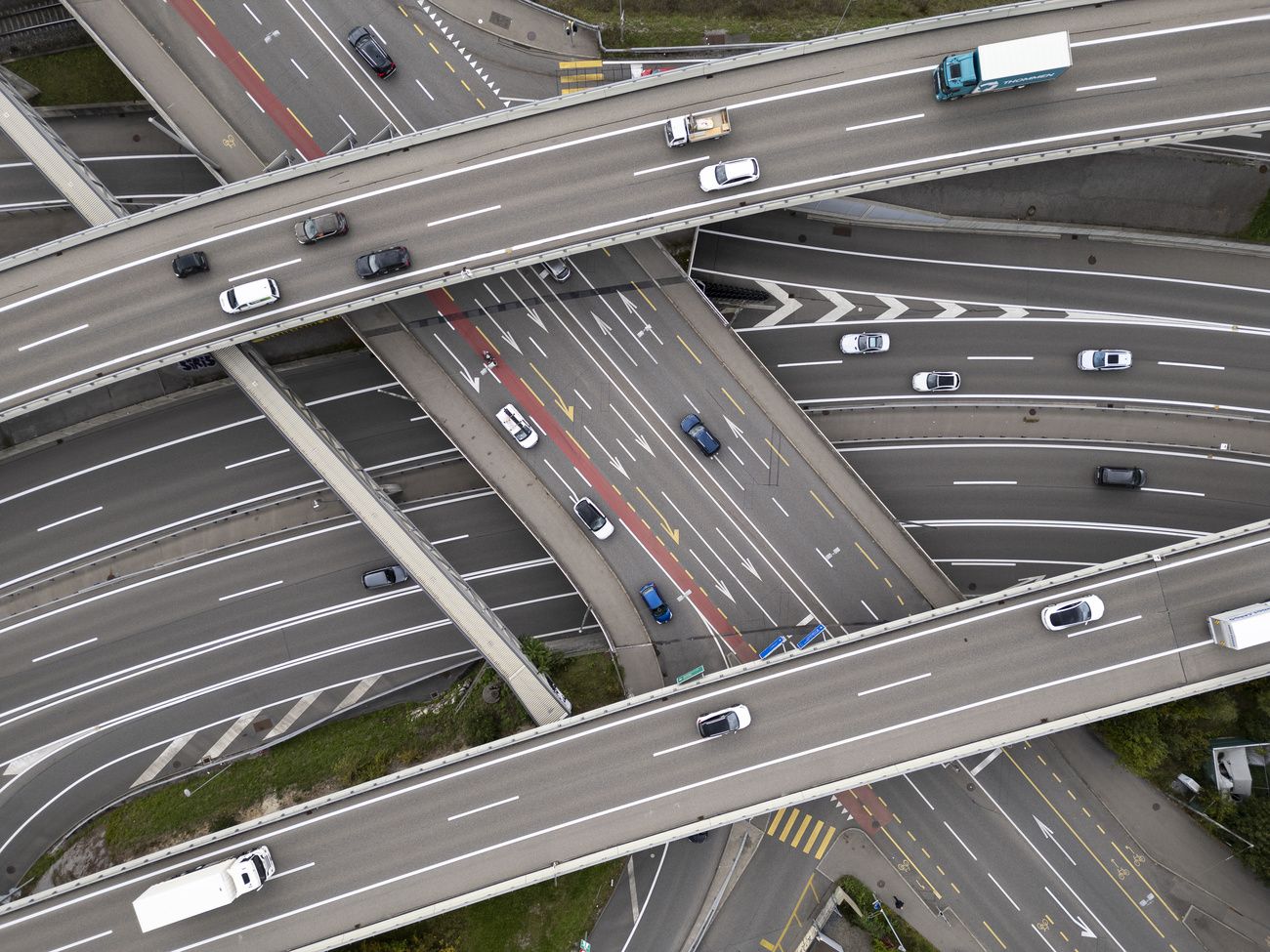
Plus
The Swiss people could refuse to widen their highways
This content was published on
13 nov. 2024
A majority of Swiss people would refuse the extension of the motorway network, reveals the second SSR survey.
read more The Swiss people could refuse to widen their highways
Favorable voting intentions have particularly lost ground among the Swiss diaspora. 60% in favor of the project during the SSR’s first opinion survey, it only approved 50% in the second.
Notably, the opposition has gained ground in almost all categories of the electorate, including within the bourgeois parties. This negative development is exceptional for a project originating from the authorities, underlined gfs.bern, which sees it as an illustration of a loss of confidence in the government and Parliament.
>> Participate in our debate:
Plus
What measures should be taken to relieve congestion on Swiss highways?
The people vote on November 24 on 6 highway widening projects. What do you think? Your opinion interests us.
See the discussion
Learn more
Following
Previous
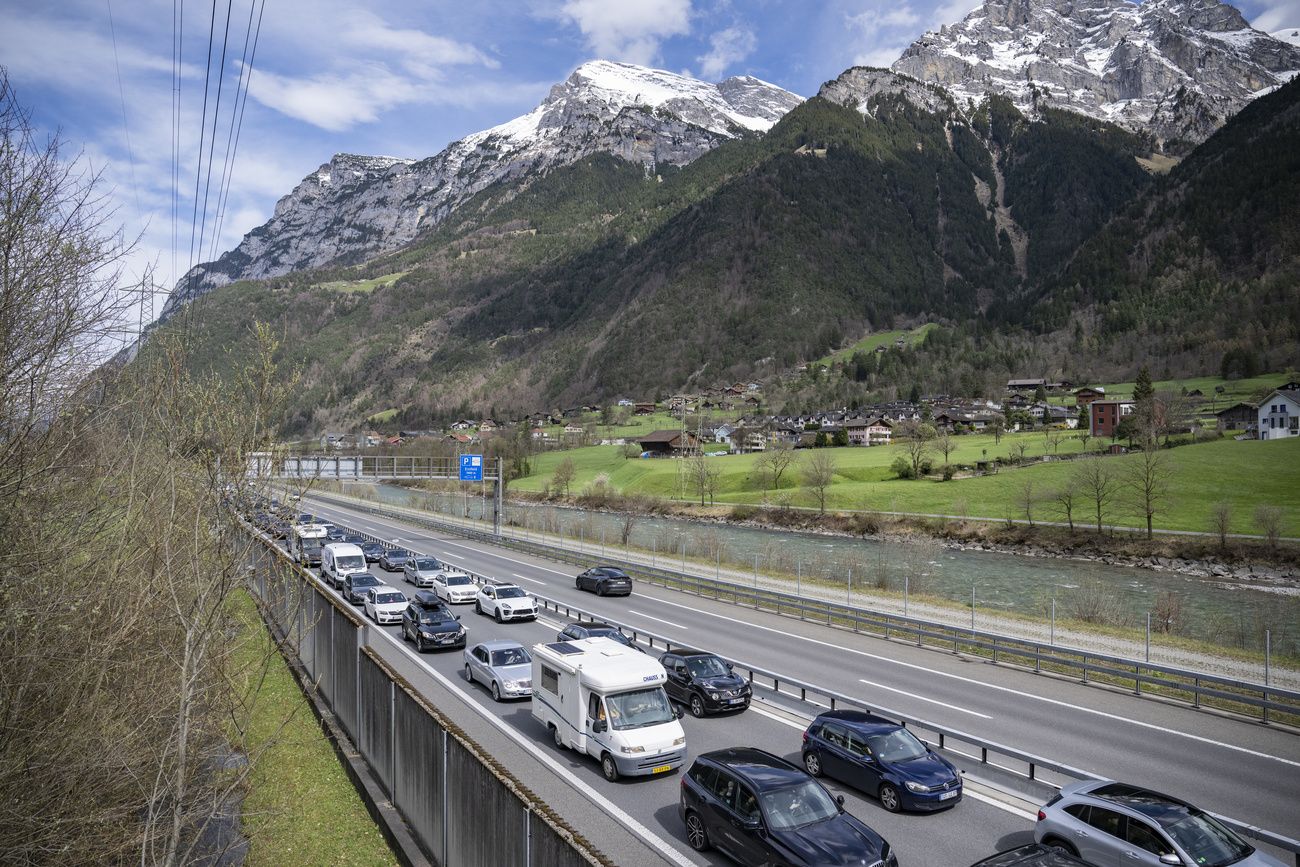
Plus
Why Switzerland, a country of rail, is still a country of motorways
This content was published on
23 oct. 2024
Some Swiss highways are close to saturation. Nearly 50,000 hours were lost in traffic jams last year. But the roots of the problem lie elsewhere than in infrastructure, according to specialists.
read more Why Switzerland, a country of rail, is still also a country of motorways
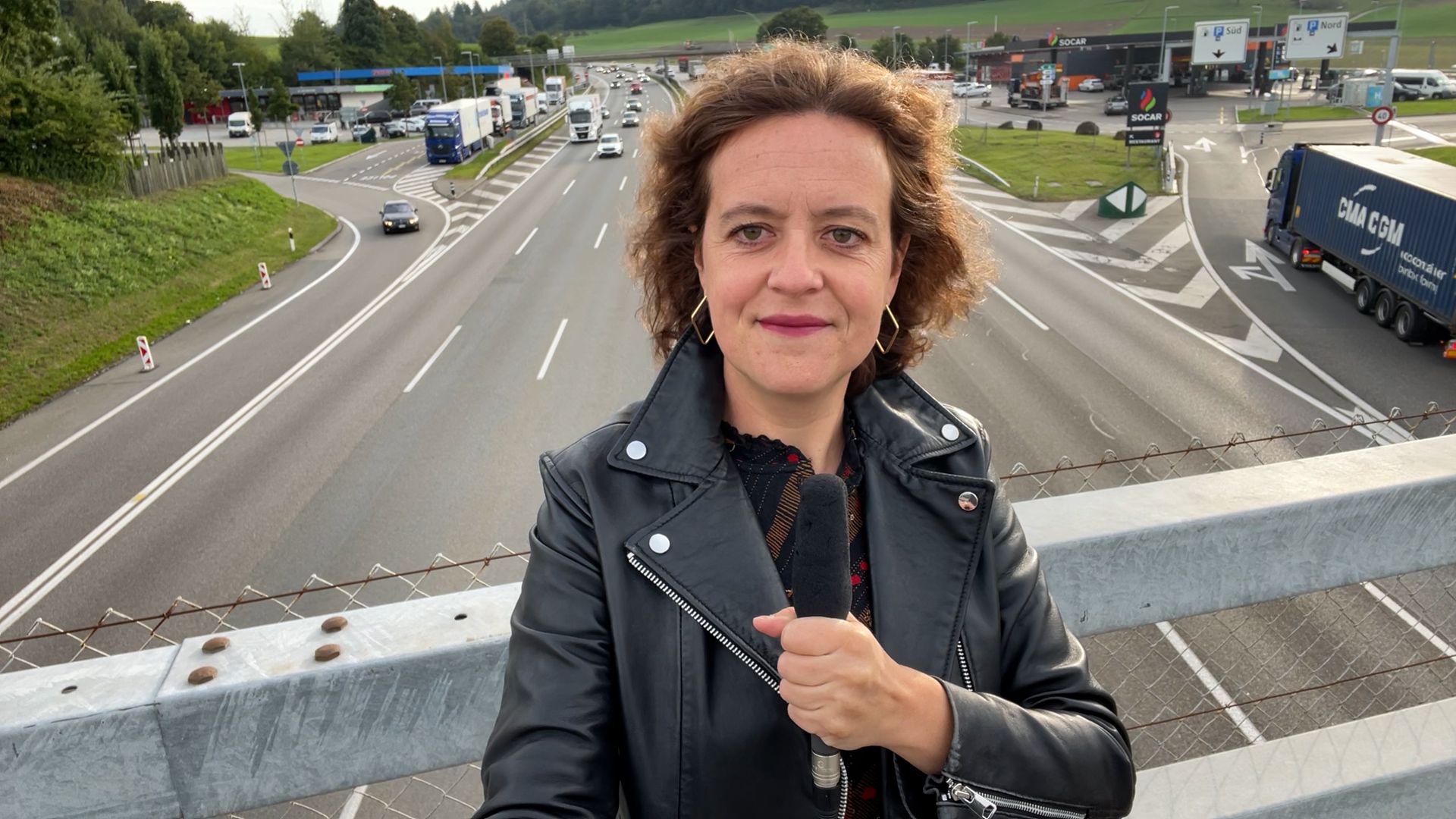
Plus
Does Switzerland need wider highways?
This content was published on
07 nov. 2024
The Swiss vote on the widening of part of the motorway network. swissinfo.ch journalist Katy Romy explains to us what is at stake in the election.
read more Does Switzerland need wider motorways?

